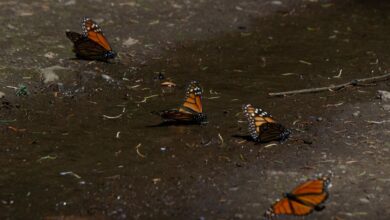Parenting through the climate crisis: Advice for raising children amid the battle for a livable planet

The torrent of emotions that accompanies the decision on whether or not to have children has been intensely complicated on our over-heating planet.
A recent review of studies in western countries, including the US and UK, asked how climate change was affecting plans to have children. It found substantial evidence that fears about the crisis were putting many people off.
In some countries, concern has become so palpable, that organisations have sprung up to help people deal with making monumental personal decisions in the midst of global existential crisis.
Among these is Conceivable Future, an organisation started in 2014 in the US by Meghan Kallman, a sociologist and Rhode Island State Senator, and Josephine Ferorelli, an activist and writer. The group aims to help tackle big questions on reproduction and parenting, along with “how to get politically involved to make the world safer for everyone’s children”.
Now, Kallman and Ferorelli have taken the lessons they have learned in the past decade and compiled those into a how-to guide, The Conceivable Future: Planning Families and Taking Action in the Age of Climate Crisis, to be published in February.
Ahead of the book’s release, Kallman and Ferorelli shared some of their key tips with The Independent:
When we face the climate crisis, it’s easy to get overwhelmed by its scale: our negative impacts feel huge, and our positive impacts feel small. But anything we do alone, whether it’s carbon positive or negative, is just individual-sized and doesn’t move the needle. The essence of social change – how we “fix” climate change – is that it has only ever come from groups. So the critical first step toward having a big, positive impact, is to get together.
This can be joining a climate-focused group like 350.org, Moms Clean Air Force, or Climate Citizens’ Lobby, or simply teaming up with one or more like-minded friends with the goal of tackling something big. We get together not just to have more hands on deck, but to support each other and connect more deeply. This allows us to be more effective and more resilient.
There are so many places to start this can also be overwhelming, but we have to start somewhere. We recommend picking an issue that affects you and your own community, and we find it helpful to pick either a “Big No” or a “Big Yes.”
A “Big No” stops bad stuff: a local polluting power plant, your bank that’s funding an oil pipeline, or your state’s fossil fuel subsidies, for example. A “Big Yes” creates good stuff: a municipal solar array; a free, frequent, electric bus route; a neighborhood or citywide composting program, for example. Another way to think about the “Big Yes” is, what are the barriers to the good thing (more renewables, better recycling, etc), and how do we remove them?
Both kinds of projects are equally urgent and important, so if you feel more drawn to one kind of goal than the other, follow your gut. But whether you’re tackling a “Big No” or a “Big Yes”, any worthwhile project will be:
1. Bigger than you. That is, a project that will also affect other people’s lives, and that you can’t accomplish alone.
2. Inspiring to you. Even if it’s not “fun”, it feels worth doing.
3. Powered by a vision of a life worth living. You can see the connection between your part and the bigger whole.
4. Possible. That is: a project, not a general idea. You can see it through in this lifetime. Maybe this decade or year.
Authors of The Conceivable Future, Josephine Ferorelli (left) and Meghan Kallman
We recommend being loud. Whatever change you want to see, or project you attempt, inform and invite everyone in your life, from your neighbors to your co-workers to your legislators. Every action is also an opportunity to build people power.
Most people are not happy with the harm, waste, and exploitation that is built into our way of life. Most people are concerned about climate change, and hoping for something useful they can actually do. Once people know you care a lot, they may seek you out with their own invitations, know-how, and resources.
And in the spirit of Ted Lasso, unless you’re actually prosecuting fossil fuel executives, be curious, not judgmental. People pitch in when they feel welcomed and valued.
A young girl holding a babydoll stands between placards during a protest rally as part of a global day of action on climate change in Istanbul, on November 6, 2021





